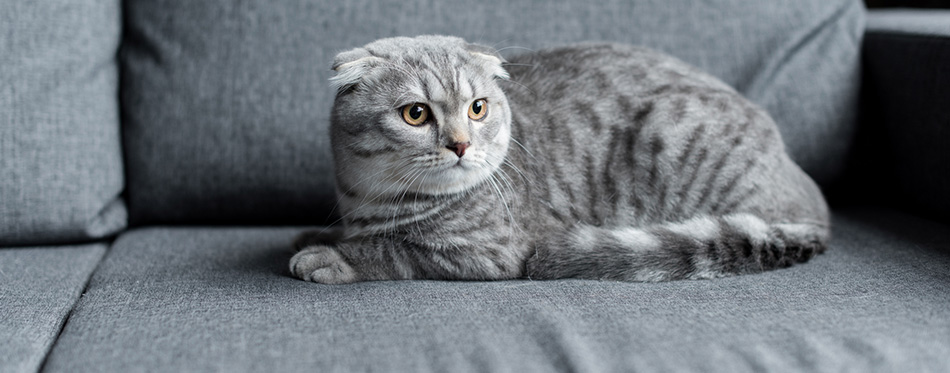Nosebleeds are medically referred to as ‘Epistaxis’ and are characterized by “acute” bleeding from the nasal cavity, nostril, or nasopharynx. The nasopharynx is located at the top of the throat. When your cat’s nose is bleeding it can be extremely distressing and anxiety provoking. Knowing what to do in the moment and understanding the reasons as to why your cat’s nose might bleed are important and can make an otherwise stressful situation easier. The odd nosebleed is usually not cause for alarm and is usually a result of some type of trauma, or a possible throat infection. However, if your cat is getting regular nosebleeds you will want to get them to your vet immediately so that the underlying cause can be found and proper treatment administered.

What to do if Your Cat’s Nose Starts Bleeding:
- Keep them calm
The most important thing if your cat’s nose starts bleeding is to keep calm. If you are anxious and stressed your cat will pick up on those unsettled feelings and this might elevate their blood pressure. When their blood pressure is elevated, further bleeding can occur and it will become increasingly more difficult to stop the bleeding. Keep them in a quiet place, free from excitement and distracting stimulants. Try to also keep yourself calm so that they don’t pick up on your nervous energy.
If you want to transport them to the vet, to get them checked out, you will need to do this as carefully as possible as the car journey itself could cause stress and elevate blood pressure levels. Place them in their cat box and keep a blanket over it so that they don’t see too much and get excited, or apprehensive. If possible, have someone drive with you who can sit next to your cat and keep them as calm as possible.
You may also like our article on Cat Carriers.
- Get icing!
It’s always a good idea to keep an ice pack or two in your freezer for emergency situations. If your cat’s nose starts bleeding grab an ice pack and place it on the bridge of their nose. This is located on the top of their muzzle. While they might struggle a little bit, the cold ice will help to stop the nosebleed and the cold temperature will constrict the blood vessels. If your cat seems very unhappy with this and it is causing them more stress than relief, then rather just try to keep them calm until the bleed subsides.
- Do not give them any medication without the medical go ahead
While you might be tempted to give your cat medication, do not administer anything without medical approval. Certain medications could make the bleeding worse, and others will do little to help, especially if it’s caused by a trauma, rather than an infection. If the bleeding doesn’t stop on it’s own after keeping your cat calm and placing an ice pack on the bridge of their nose, you will want to get them to a vet.
NB: If your cat is showcasing any other worrying symptoms while their nose is bleeding, get them to your vet or an emergency vet immediately. It is always better to get strange behavior and symptoms checked out immediately. Worrying symptoms might include:
- Difficulty breathing
- Nausea or vomiting
- Stomach upset
- Lethargy
- Not eating or drinking
- Dizzy or confused
If your cat has a big nosebleed, they might end up swallowing a lot of blood. If this is the case, their stools might be darker in color, or even black and they might vomit up some blood clots. This is usually not a sign of an infection of their intestinal track. Nevertheless, if you are worried, or they seem unwell, get them checked out. It’s always better to be safe rather than sorry when it comes to your pets and their health. While nosebleeds are usually not a huge cause for alarm, there are cases when they reflect a more dangerous underlying medical condition.

Why Might Your Cat Get a Nosebleed?
The two main causes of nosebleeds in cats are usually trauma (they bumped their nose, or were playing too excitedly with their feline friends), or a throat infection. Trauma nosebleeds usually heal quickly (unless of course it’s a big accident!) and nosebleeds caused by infection should begin to clear once your vet administers the appropriate medication to tackle the infection.
However, if the nosebleeds are not caused by infection or trauma, they could signal something more serious. It is thus imperative to keep an eye on your cat and to get them to your vet if you think it could be something more serious. More serious reasons as to why their nose might bleed can include:
- Accidental poisoning by a rodent killer, or weed killer: Poisoning is very serious and will usually be accompanied by other signs like vomiting, disorientation, difficulty breathing, or extreme lethargy. This is an emergency situation and without medical help could be fatal. Get them to your vet ASAP!
- Diseases and conditions: There are a number of serious diseases that can also cause nosebleeds and if you’ve ruled out an infection, trauma, or poisoning it could be one of the following.
However, you will need a vet to diagnose this condition and they will be able to offer various treatment options. Diseases and conditions might include:
- Feline Leukaemia Virus
- Bone marrow disease
- Hemangiosarcoma (a cancer of the blood vessels)
- Hemophilia
- Fungal diseases
- Anxiety
- Cancers
- Dental abscesses
- Anemia
- High blood pressure
- Allergens
- Parasites
- Nasal ulcerations
- Von Williebrand’s disease
Diagnosis
Figuring out the underlying cause for your cat’s nosebleed will enable you to treat the problem effectively. When you take your cat to the vet they will probably run a number of tests in order to determine what the problem is.
Vets might want to do an entire blood analysis and it can take a while for them to get the results. Other tests can check their blood platelet levels and check for various diseases like bone marrow disease, or cancer. Your vet might also run a urine analysis test, and maybe also want to do an ultra-sound examination on your cat to see if there are any tumors or masses present. They might also want to do an X-ray, or a Cat scan if they are unsure what is causing the bleed.

Treatment
- Antibiotics:
If the bleed is caused by a throat infection, your vet will probably administer antibiotics and this should clear up the infection and thus the underlying cause of the bleed.
- Surgical cauterization:
If your cat is experiencing chronic nosebleeds due to weakened blood vessels, your vet might opt to surgically cauterize the vessels. This can help to seal their blood vessels and scar tissue will develop. This will ultimately help to prevent any more bleeding.
- Anti-anxiety medications:
If your cat’s nosebleeds are a result of anxiety, your vet might prescribe calming medication, or tranquilizers. It is of course important to figure out why your cat is anxious and to try and free their environment of any anxiety-inducing situations.
Related Post: Cat Calming Sprays
- More severe treatment options:
If your cat has a more serious illness, your vet will have to administer more rigorous treatments. They will discuss treatment options with you and together you can figure out a plan of action.
Nosebleeds are usually not cause for great alarm, and if this isn’t a chronic problem and accompanied by other symptoms, it is most likely an anomaly that won’t reoccur. However, if you suspect that there is a more pressing medical problem at hand, get your cat to the vet immediately. The quicker you can treat potential problems, the better the chance of your cat making a full recovery and feeling better.

